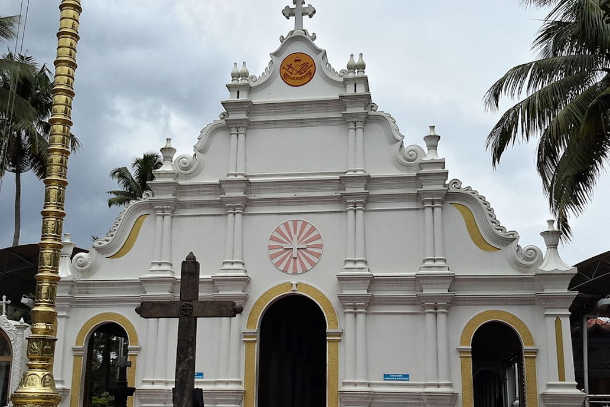
The 450-year-old Marthoman Church in Mulanthurithy, Kerala, which police took from the Jacobite faction on Aug. 17 following a court order. (Photo: Wikipedia)
Tension escalated in parts of India's Kerala state as police used force to take over some churches of a Christian faction following a court order, aiming to give them to a rival camp.
In pre-dawn operations, police took over three churches of the Jacobite faction on behalf of the Malankara Orthodox faction. Police used force to remove hundreds of protesters including Jacobite priests and bishops.
"Women, children and bishops were subjected to cruel police brutality," said a statement by Jacobite bishops after they met in an emergency synod on Aug. 20.
They also registered their protest against the "inhuman and unjust" attitude of the Supreme Court that resulted in "the rushed move to take over the churches of the Jacobite Church."
The synod decided to organize protests at their churches while following Covid-19 protocols.
The synod also declared the severance of "all sacramental and spiritual relationship" with the Orthodox faction, said Joseph Mar Gregorios, the metropolitan trustee and senior bishop of the Jacobite Church.
The factional fight is centuries old, but the Supreme Court verdict in 2017 said most disputed church properties should be taken from the Jacobite faction and given to the Malankara Orthodox group.
The state delayed the implementation of the order because of the sensitivities involved. The Orthodox faction, however, approached the court again to seek the implementation of the order.
The court asked the state to implement the order, which resulted in the latest police action.
An official told media that revenue officials had taken the churches' keys and will submit them to Kerala High Court.
More than 1,100 churches in the Jacobite Church's possession are under the threat of forceful acquisition after the court order, said Biby Kadavumbhagam, who edits an official publication of the Jacobite faction. "We are very sad that some 50 churches have already been handed over to the Orthodox faction after the Supreme Court order," he told UCA News on Aug. 20He said the Orthodox faction has only a "minuscule presence" but the court order has given them "an upper hand in the Church's temporal properties."
Both churches exaggerate their population but experts estimate both together could number some two million of some six million Christians in Kerala.
Kadavumbhagam claimed the court order had created a peculiar situation of two or three families claiming an entire church.
For example, Thiruvarppu Parish, whose church was taken over this week, has some 170 families but only two belong to the Orthodox Church.
"But now police took the church and gave it to them, and the majority are now forced find an alternative arrangement for their worship," Kadavumbhagam said.
"But our faith is strong, and we will not go anywhere. We will face and grow."
Centuries-old feud
The factionalism in the indigenous Malankara Church, a branch of the Syrian Orthodox Church of Antioch, led to a split in 1911 with the establishment of the Malankara Orthodox Church.
The Orthodox faction have their supreme head based in Kerala, while Jacobites owe their allegiance to the Patriarch of Antioch.
Following the split, a dispute over their temporal properties — large patches of prime land and centuries-old churches and related institutions — began and factionalism widened.However, in 1934 they came together, agreed on a common constitution and elected a Catholicos of the East as the common head.
They split again in 1973, unable to find ways to share ownership of the church's land and vast resources. Each faction then took over properties in areas where they were numerically stable.
Streets fight, disputes and legal battles in several courts continued, forcing the state police to close several churches. Court cases between them and against the state continued for years.
The Supreme Court ruled that the Catholicos of the East remains the church's head according to the 1934 constitution.
The Jacobite faction refused to accept the decision and moved court with newer arguments. But the court in July 2017 rejected the cases, saying their 1934 agreement stood.
The 1934 constitution agreed that the Patriarch of Antioch has no temporal powers in India and that the Catholicos of the East is their head in India.
As such, the court said, the head of the church in India has complete authority to manage church properties.


